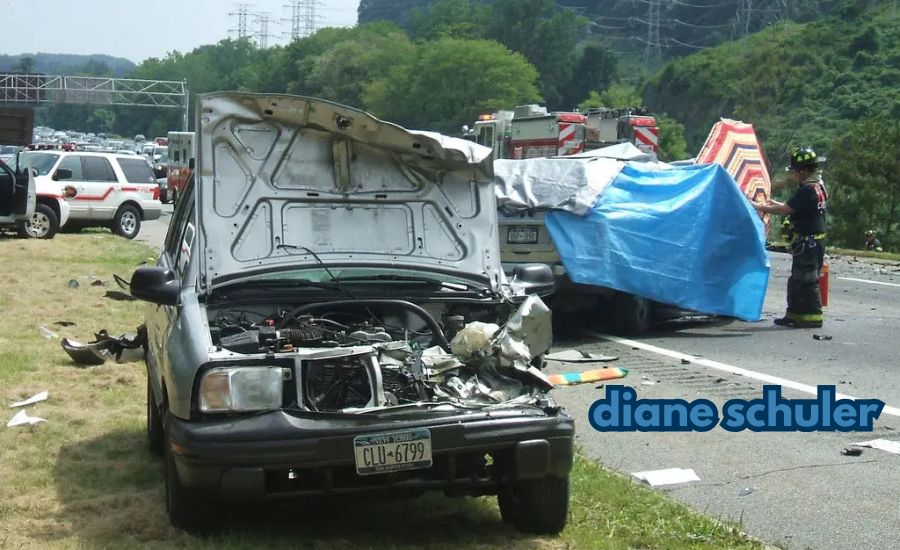The story of Diane Schuler is both tragic and complex, leaving many questions unanswered. Here at US NOWADAYS, we dive deep into this incident to explore what led to the tragic accident on the Taconic State Parkway, which took the lives of eight people, including Diane and nearly all of the young passengers in her van. This case has been covered extensively, but we aim to provide new insights and analysis, surpassing other information available to help you understand the complete picture of what happened and the lasting impact it left behind.
What Happened on the Taconic Parkway: The Timeline of Events
Diane Schuler’s accident on July 26, 2009, remains one of the most tragic stories on the Taconic Parkway. Diane was driving a minivan with her two young children and three nieces when her vehicle unexpectedly entered the northbound lane of the parkway, traveling nearly two miles in the wrong direction. Witnesses recalled seeing her van swerving, with some drivers desperately trying to avoid a collision. Tragically, she collided head-on with an SUV, resulting in the loss of her life, six children, and three other people in the SUV.
The Autopsy Report: What the Toxicology Results Revealed
The toxicology report conducted post-accident revealed high levels of alcohol in Diane Schuler’s blood, along with traces of THC, the active ingredient in marijuana. Her blood alcohol concentration was reported to be at .19, more than double the legal limit. The presence of THC suggested recent marijuana use. These findings shocked her family, who knew Diane was a responsible person who rarely drank. However, the toxicology results raised significant questions about what led her to be in such a state on that day.
Family Reactions and Theories: A Search for Answers
Diane Schuler’s family, particularly her husband, Daniel Schuler, has contested the findings of the toxicology report, stating that she wasn’t someone who would drive under the influence. Daniel argued that Diane might have suffered from a medical emergency, such as a stroke, which could have impaired her driving and judgment. This theory remains one of the few explanations offered by her family, who found it hard to reconcile the Diane they knew with the toxicology findings.
Health Issues as a Possible Cause: Could a Medical Condition Be to Blame?
Some reports suggest that Diane Schuler may have suffered from undiagnosed health issues. Chronic pain, migraines, and other underlying conditions could have led her to consume alcohol or marijuana as a form of self-medication. Her husband indicated that she had been experiencing tooth pain before the accident, which she had intended to address. This theory posits that her condition could have affected her judgment and potentially led her to act out of character.

Public and Media Reaction: How the Story Gripped a Nation
The Diane Schuler case became widely publicized, drawing intense media attention due to the tragic loss of young lives and the mystery surrounding her actions. News outlets covered the story extensively, some portraying Diane as a reckless driver. In contrast, others sought answers to understand her possible motives or conditions. Many people across the country followed the case, feeling the grief and frustration of each new revelation or unanswered question.
Read Next: Lakemchenryscanner
The HBO Documentary: “There’s Something Wrong with Aunt Diane
In 2011, HBO released a documentary titled There’s Something Wrong with Aunt Diane, which aimed to uncover more details about the incident. The documentary featured interviews with family members, witnesses, and experts, all seeking to shed light on what could have caused Diane’s unusual behavior. It has since sparked significant public interest, with viewers left pondering the tragedy and searching for explanations that align with Diane’s character.
Examining the Legal Impact: The Aftermath and Lawsuits
Following the accident, the families of those affected pursued legal action. Lawsuits were filed against Diane Schuler’s estate, claiming that her actions had led to the wrongful deaths of other individuals. This legal aftermath brought additional complexity to the case as families sought justice and accountability. The lawsuits highlighted the importance of understanding the risks associated with impaired driving, reinforcing the need for awareness and prevention.
Addiction, Denial, and the Hidden Struggles of Substance Abuse
For many, the Diane Schuler case served as a reminder of the hidden struggles some people may face with addiction. Although Diane was not publicly known to have substance abuse issues, her toxicology report suggests she may have had a private battle. This raises questions about the role of denial and unaddressed mental health issues. It also serves as a point of reflection for families dealing with similar challenges.
Lessons Learned: How the Diane Schuler Tragedy Changed Perspectives
The Taconic Parkway accident has led to increased awareness of the dangers of impaired driving, sparking conversations about road safety and mental health. Families, lawmakers, and the general public have since advocated for stricter DUI laws and increased mental health support to prevent similar tragedies. The lessons learned from this case emphasize the importance of seeking help, recognizing warning signs, and addressing health issues before they escalate.

Remembering the Victims: Honoring Lives Lost
As we discuss the events surrounding Diane Schuler, it’s essential to remember the lost lives. The tragedy claimed the lives of innocent children and left families devastated. Their memory serves as a reminder of the importance of road safety, mental health, and open dialogue about personal struggles. Each year, those impacted by the incident reflect on the importance of fostering compassion and support within families and communities.
Conclusion
The Diane Schuler case remains a somber reminder of the complexities behind tragic events. While the circumstances surrounding her actions may never be fully understood, the impact of the accident has changed perspectives on road safety, mental health, and the hidden struggles people face. Here at US NOWADAYS, we hope this exploration helps others recognize the importance of seeking support and addressing health concerns before they escalate.
The tragedy has taught many the importance of compassion and understanding and the need to remain vigilant about the well-being of those around us. Although Diane Schuler’s story is one of heartbreak, it also serves as a call to action for families and communities to come together in support and prevention.
FAQs
Q: What caused Diane Schuler’s accident on the Taconic Parkway?
A: Diane Schuler’s accident is believed to have been caused by impaired driving, as her toxicology report showed high levels of alcohol and traces of marijuana. However, some family members suggest that a medical condition may have been a factor.
Q: What did the toxicology report reveal about Diane Schuler?
A: The report showed that Diane Schuler had a blood alcohol level of .19, more than double the legal limit, along with THC from marijuana.
Q: Did Diane Schuler’s family agree with the findings of the toxicology report?
A: Diane Schuler’s husband, Daniel Schuler, disputed the findings, suggesting she may have had a medical emergency that contributed to the accident.
Q: Has there been any media coverage of this case?
A: Yes, HBO released a documentary titled There’s Something Wrong with Aunt Diane in 2011. The documentary delves into the circumstances and family perspectives surrounding the tragedy.
Q: How has this incident impacted public awareness?
A: The Diane Schuler case has heightened public awareness about impaired driving, mental health, and the importance of addressing personal struggles openly.
You May Also Like: US now A Days










